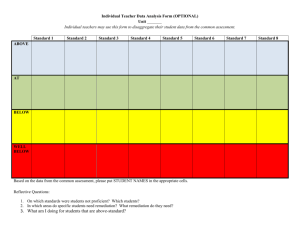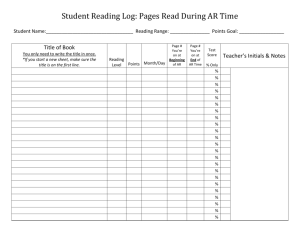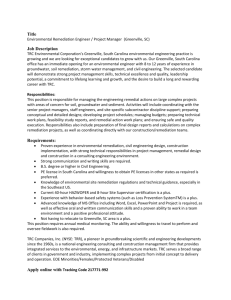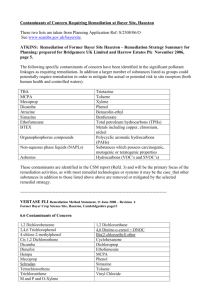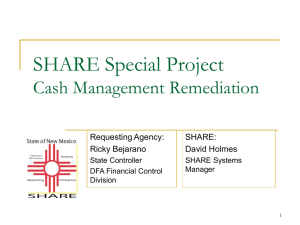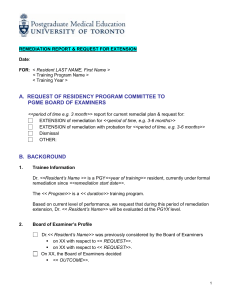Remediation Plan Template - College of Medicine
advertisement
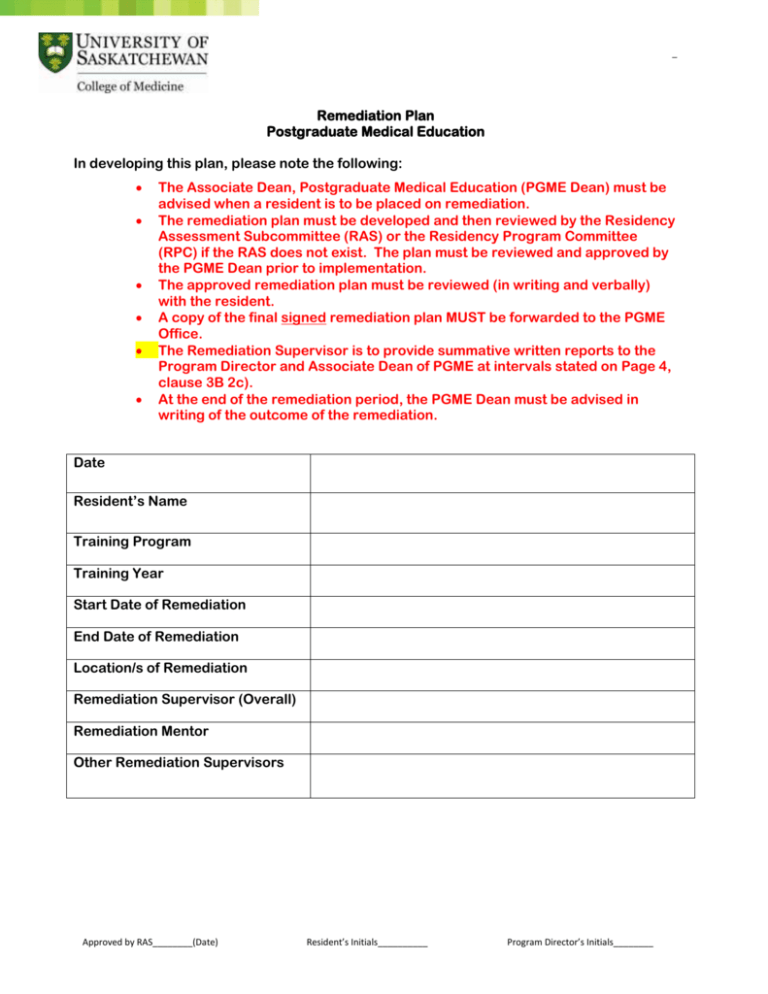
1 Remediation Plan Postgraduate Medical Education In developing this plan, please note the following: The Associate Dean, Postgraduate Medical Education (PGME Dean) must be advised when a resident is to be placed on remediation. The remediation plan must be developed and then reviewed by the Residency Assessment Subcommittee (RAS) or the Residency Program Committee (RPC) if the RAS does not exist. The plan must be reviewed and approved by the PGME Dean prior to implementation. The approved remediation plan must be reviewed (in writing and verbally) with the resident. A copy of the final signed remediation plan MUST be forwarded to the PGME Office. The Remediation Supervisor is to provide summative written reports to the Program Director and Associate Dean of PGME at intervals stated on Page 4, clause 3B 2c). At the end of the remediation period, the PGME Dean must be advised in writing of the outcome of the remediation. Date Resident’s Name Training Program Training Year Start Date of Remediation End Date of Remediation Location/s of Remediation Remediation Supervisor (Overall) Remediation Mentor Other Remediation Supervisors Approved by RAS________(Date) Resident’s Initials__________ Program Director’s Initials________ 2 1. Rationale The decision to place the Resident on Remediation was made based on one or more of the following: Failure to achieve a satisfactory level of competence in a clinical rotation or longitudinal clinical experience from __________________ to ____________________. Repeated deficiencies in one or more competencies across several (more than two) rotations (please specify with dates). An unsatisfactory or a failing grade on a summative assessment examination. A newly recognized, serious problem in professional behaviour. Other, please indicate_____________________________________________________________ Specific areas of Trainee’s performance/behaviour that require Remediation The remediation period is required because of failure of the resident to achieve a satisfactory level of performance in the following: Medical Expert Communicator Collaborator Manager Health Advocate Scholar Professional For each CanMEDS Role of concern, please list domains of weakness and provide a detailed description of the specific deficiencies. Approved by RAS________(Date) Resident’s Initials__________ Program Director’s Initials________ 3 2. Remediation Plan CanMEDS Role/FM Principle Domain Objectives (Defined expectations in keeping with resident’s year in program) e.g. Medical Expert Role Clinical Decision Making Proposed Learning/Teaching Strategy; Resources available to trainee (including accommodations if any is required); Person responsible Recognize, diagnose, and initiate management of low risk obstetrics. Demonstrate comprehensive history taking and develop a differential diagnosis Approved by RAS________(Date) Resident’s Initials__________ Program Director’s Initials________ Assessment strategies; Person responsible for arranging and administering assessment; Assessment method/tool; PGY level to be assessed at; Frequency and timing of assessment; Frequency of feedback; Benchmarks for achievement/milestones 4 3. Responsibilities and Expectations during the Remediation Period 3A. Resident Dr. ______________________ undertakes to achieve the following minimum performance standards: 1. a) Be available for and participate in the remediation plan outlined in section 2 above. b) The resident’s responsibility in arranging these learning opportunities/ assessments is:_______________________________ 2. Meet the objectives in section 2 above to the defined level of performance. 3. Meet with his/her Remediation Mentor Dr. __________________ at (specify: weekly/biweekly/monthly) _______________ intervals of during the remediation period to discuss progress and ongoing objectives. a) The mentorship meetings will include:_____________________ b) Mentorship meetings will be arranged by:__________________ c) The minimum expectation for mentorship meetings is:______ 4. Other expectations: a) (define) b) (define) 3B. Overall Remediation Supervisor 1. The overall remediation supervisor is Dr. _______ ______________ during the remediation period from ________________ to __________________. 2. The responsibilities of the overall supervisor are: a) To compile written assessment reports based on feedback from all physicians involved in the remediation period at ____________ (specify: weekly/biweekly/ monthly) intervals. b) To review the written reports in regular face to face review sessions with the resident ____________ (specify: weekly/biweekly/monthly). c) To provide summative written reports to the Program Director and Associate Dean of PGME at ____________ (specify: weekly, biweekly, monthly) intervals. d) To compile and present a final summative report to the Resident Assessment Subcommittee of the Residency Training Committee. This will be used in determination of the overall outcome of the remediation period. Approved by RAS________(Date) Resident’s Initials__________ Program Director’s Initials________ 5 e) To advise the Program Director and Associate Dean of PGME if there are any substantive concerns with performance or if there is lack of progress in meeting the objectives of the remediation period. f) Other_________________________________________________________ 3C. Remediation Supervisor/s 1. Drs. ___________________________agree to assist Dr. __________________in achieving the desired remediation during the remediation period from ________________ to __________________ by (check all that apply): Clarifying the difficulties the resident is having with knowledge base Providing extra teaching in clinical matters Providing supervision and training in procedural skills Counselling regarding deficient attitudes Assessing Dr. __________________ by means of and providing written performance assessments at ____________ (specify: weekly/biweekly/monthly) intervals, and to immediately inform the resident and Program Director of any substantive performance concerns. Other: __________________________________________________________ 3D. Remediation Mentor 1. Dr. ______________ agrees to serve as a mentor and meet with Dr._____________________ at ____________ (specify: weekly/biweekly/monthly) intervals. Responsibilities of the mentor include: Regular review and clarification of the objectives and assessment of the resident’s progress in achieving the objectives of the remediation period. Monitor the resident’s experiences with clinical supervision and feedback, assist the resident in resolving concerns if there are difficulties encountered in meeting the remediation requirements as outlined above by (as appropriate) clarifying the resident’s responsibility, communicating concerns beyond the resident’s control to the Program Director and Remediation Supervisor. Monitor, guide, and assess both program-directed and self-directed learning /studying. Direct the resident to appropriate resources as necessary. Approved by RAS________(Date) Resident’s Initials__________ Program Director’s Initials________ 6 Keep written records of meetings, concerns and progress, and to submit these to the resident’s Program Director. Other: 4. Outcomes The Residency Assessment Subcommittee will review all relevant documentation to determine the outcome of the remediation period. 1. Successful remediation will require Dr. ____________________________(resident) to meet the above listed objectives to the defined level of performance. 2. If other deficiencies are identified during this remediation period, the program will address this by modifying this plan or developing an additional plan, as appropriate. 3. Successful completion of the remedial period will result in reinstatement in the program with credit applied to training up until the commencement of the remedial period. No credit is applied to the remedial period of training. a) Unconditional return to training: If the remediation period is deemed to have successfully resolved all concerns about resident performance, reinstatement will be without conditions. b) Conditional return to training: In the event that there is sufficient progress for the resident to return to training but there are residual concerns, return to training may be limited by specific conditions at the discretion of the Resident Assessment Subcommittee of the residency program committee. These conditions must be clearly articulated (along with reasons) and provided in writing to the resident. Continued supplemental support must be provided to assist the resident in resolving any remaining issues in a timely manner. 4. A failing performance will be identified by (but not necessarily limited to) the following indicators: a) (define) b) (define) 5. Unsuccessful completion of the remedial period may result in any of the following outcomes, as recommended by the residency training committee after review of the resident’s performance and achievements during the remedial period: a) Extension of the remediation period i. with partial credit for the remediation period completed ii. with no credit for the remediation period completed Approved by RAS________(Date) Resident’s Initials__________ Program Director’s Initials________ 7 b) Conversion of an unsuccessful remediation period to a probation period c) Termination d) Other (define) 5. Development of the PLAN The Residency Assessment Subcommittee (RAS) was involved in development of plan. The Resident was involved in development of plan. The Resident has been provided a copy of the plan. The PGME policies and procedures on Assessment of Trainees was followed in the development of this plan (see link below). List and describe any extenuating circumstances pertinent to the development or execution of this Remediation Plan:_____________ 6. Resident Acknowledgement I understand the following about this remediation program: The identified areas to be remediated The expected level of performance on remediation objectives / competencies The nature of the remedial program The time frame of the remedial program The assessment modalities to be used The consequences of successful/unsuccessful remediation I have been given the chance to clarify all components of this remediation plan I have been made aware of the following document: Assessment of Postgraduate Trainees: Guiding Principles – Policies and Procedures: Promotion and deferral of Promotion, Remediation, Probation, Dismissal, Appeal that is on the University of Saskatchewan College of Medicine Postgraduate Medical Education Website and available as a reference http://www.medicine.usask.ca/education/medical/postgrad/policiesguidelines/Assessment%20of%20PGME%20Trainees-Guiding%20PrinciplesFINAL%20Sept%2016%202009.pdf Signature of Resident Approved by RAS________(Date) Date Resident’s Initials__________ Program Director’s Initials________ 8 7. Other Signatures Program Director Date Remediation Mentor Date Remediation Supervisors Date PGME Associate Dean Date Approved by RAS________(Date) Resident’s Initials__________ Program Director’s Initials________ 6 Final Remediation Evaluation Postgraduate Medical Education Dr. _______________________________ has completed a remedial period in __________________________ from _____________________ to _______________________. CanMEDS Role Objectives Pass Borderline / Provisional e.g. Medical Expert e.g. Recognize, diagnose, and initiate management of low risk obstetrics. Demonstrate comprehensive history taking and develop a differential diagnosis Overall Approved by RAS _______(date) Resident’s initials ______ Program Director’s initials ______ Fail N/A 1 The following assessment modalities were used to inform this final assessment: NB: the resident must be aware of all information contributing to the final evaluation (including the content and source). Direct observation OSCE Written examinations Oral examinations Chart reviews Review of resident notes (consults, dictations, OR reports etc.) 360 evaluation Solicited feedback Simulations Other (specify) Overall, the remediation process is considered: successful Signature of Resident Date Signature of Probation Supervisor Date Signature of Program Director Date unsuccessful NOTE: The outcome of the remediation MUST be presented in writing to the PGME Dean immediately following the remediation period. [Type text] 5 4
